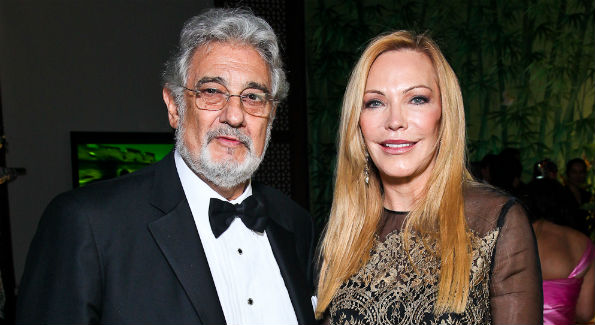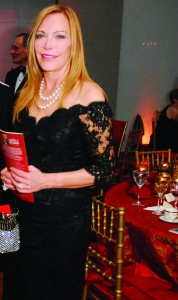Susan Lehrman’s charitable contributions are well-known in Washington.
By Sarah Valerio

Susan Lehrman got involved with the Washington National Opera under Placido Domingo’s director-ship. (Photo by Tony Powell)
One would be hard pressed to find a more tireless fundraiser for the arts in the nation’s capital than Susan Lehrman.
Lehrman serves on the boards of the Washington National Opera, the James Madison Council of the Library of Congress and the Mariinsky Foundation of America. Last year she served as chairman of the Opera Ball, the Washington National Opera’s largest annual fundraiser, raising an impressive $2 million in one night after underwriting the entire cost of the event.
“When I think about the importance of giving, I’m often reminded of the phrase, ‘you can only wear so many pairs of shoes, ’” Lehrman says.
“In other words, there is only so much stuff one person can have or need, which leaves plenty of room for giving and volunteering.”
Lehrman was recently awarded the prestigious Medal of the Ministry of Foreign Affairs of the Russian Federation for her contributions to international diplomacy, thereby becoming the first American to receive the award. She has also been honored with the insignia of Chevalier of the Legion of Honor, France’s highest honor for non-French citizens.
“It was an incredible surprise and honor for me, especially to receive both awards within a week of each other,” Lehrman says. “The awards were a highlight of my life.”
Lehrman was chosen to receive the Ministry of Foreign Affairs medal for helping to promote Russian art. As founder and advisory chair of the Initiative for Russian Culture, a program focused on promoting cultural understanding about the Russian culture to American students, she helped expose Russian culture through academics to students throughout the mid-Atlantic and Washington metropolitan area. An American University initiative, the program includes courses, film series discussions and cultural exchange programs.
Her profound understanding of the diplomatic value of cultural understanding and appreciation earned Lehrman the rank of Chevalier in the national Ordre de Legion d’Honneur.
“Her personal involvement – including the Kids Euro Festival, the Washington National Opera, the American University Initiative for Russian Culture, the Youth Orchestra of the Americas, and others – is a reflection of her commitment and dedication to the expansion and strengthening of international relations through the language of the arts,” French Ambassador Francois Delattre said in commending her.
The French ceremony was conducted in the presence of approximately 40 friends and family members and was followed by a dinner at the French residence.
The ceremony at the Russian embassy included opera music and a surprise appearance by Daniel Heifetz, a renowned concert violinist and founder of the Heifetz International Music Institute. The approximately 300 guests enjoyed a feast that included caviar, champagne, vodka and Fabergé-egg-themed cakes set amid ice sculptures.
Lehrman has served as a major sponsor of the 2010 Fulbright Prize for International Understanding Award Ceremony and major sponsor and Co-chairwoman of the 2011 Fulbright Lifetime Achievement Medal Dinner. She is also an integral liaison and lead sponsor for the Youth Orchestra of the Americas 2011 World tour of China, and since 2009, as a major sponsor of the Kids Euro Festival, a cultural program provided by the European Union member countries for children in the Washington area.
Among her accomplishments, Lehrman’s appreciation for the arts – particularly opera – stands out.
“Opera is the amalgamation of all the arts, combining vocal and instrumental talent with all of the elements of theater,” she says. “It’s very important for our nation’s capital to have an international opera company.”
Lehrman’s passion for charity and music were instilled in her at an early age.
“My parents were very involved with charities as I was growing up and they were an inspiring example,” she says of her upbringing in Gainesville, Fla.
“My greatest source for inspiration has always been my mother. From a very early age, she encouraged me to look beyond the exterior of a person, that is, what they’re wearing, what they look like, what they drive, etc.
, and really try to discover what’s on the inside … what’s in their heart. This very fundamental advice has been a wonderful gift to me on so many levels personally and professionally and I believe this lesson is key to cultural understanding, too.
”
Lehrman pursued the piano early on but came to prefer singing. She started voice lessons at 13 and studied voice most of her life. Though she studied opera, she never pursued it professionally. Lehrman generally sang the role of the young ingénue lead, such as Bianca in “Kiss Me Kate.” At the time she became involved with the Washington Opera, Placido Domingo was the director. Working with him, she says, was a “wonderful and great experience.”
Lehrman’s philanthropy includes endowing a chair in Russian History and Culture at American University; a chair in Algesiology for the study and treatment of pain at the University of Medicine and Dentistry of New Jersey; renovation of a Bone Marrow Transplant wing at Columbia Presbyterian Hospital in New York City, the Carmel Cancer Center at Memorial Sloan Kettering Hospital, and the Robert Carmel Conference Room at the Lenox Hill Hospital in New York City.
Her late husband died of cancer and she cites her first-hand experience in the suffering involved with that disease as a major reason for her involvement with healthcare charitable works.
In view of current economic problems and the fact that many philanthropic givers have been tightening their wallets, Lehrman stresses the need for continued giving to others. “Whether it’s through monetary donations, or through volunteering time or expertise, it is important to get involved and help when and where you can, however you can.
”

